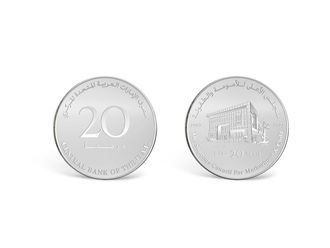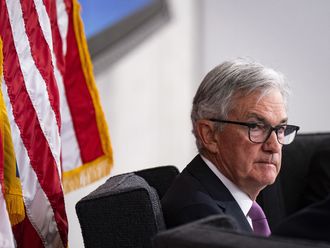
Dubai: Global credit rating agency Standard & Poor's is keen on expanding its sovereign ratings services in the Middle East. Although the agency rates the emirates of Abu Dhabi and Ras Al Khaimah separately, it does not rate the UAE federation as a sovereign.
In a recent interview with Gulf News Moritz Kraemer, S&P's head of sovereign ratings for Europe, the Middle East and Africa, said the absence of a sovereign rating for the federation will be an obstacle to widening the investor base for the country as a single unit.
S&P has assigned an AA rating for Abu Dhabi and an A rating for the emirate of Ras Al Khaimah. Although Dubai had expressed its interest in getting a credit rating for itself in the past, prior to its recent bond issue, the emirate's Department of Finance said this was not the right time for credit rating. The unrated issue was four times subscribed and priced at a yield of 6.7 per cent on the $500 million (Dh1.8 billion) five-year tranche and 7.75 per cent for the $750 million 10-year tenor with spreads of 542.7 and 527 basis points respectively, over US Treasuries.
Kraemer believes that the UAE's unique form of fiscal federalism would warrant individual sovereign credit ratings for each emirate, however, it is still possible to issue a single rating for the country as a whole.
In the Gulf region, although most sovereigns do not require debt issues to balance their budgets, Kraemer said obtaining sovereign ratings will be an important step towards establishing benchmarks in each country to create a vibrant domestic debt markets through which private sector can attract international capital.
Gulf News: Gulf economies are largely resource economies with a big portion of their gross domestic products (GDP) coming from hydrocarbon income. Does this mean the oil prices and oil market outlook will be key drivers of sovereign ratings in the region?
Moritz Kraemer: It is true that crude output and prices have a big role in the economies of the Gulf region. But it is not so much the level of the oil prices that will determine the rating of a sovereign. Clearly, these economies are better off when the oil prices are higher. But our views take into account the fluctuations and oscillations of commodity prices based on their movements over the past several decades.
We do not change the ratings of these sovereigns every time when the oil prices move up and down, that would add no value. Our aspiration remains doing the rating through the cycles, whatever the stage cycle in which the economy is going through. Obviously we can't allow factors linked to commodity cycle to decide whether a sovereign, currency or an underlying asset as investment grade or non-investment grade.
When it comes to sovereigns, factors such as transparency, availability of credible data, and maturity of institutional frameworks will be the key drivers of ratings. That holds true for GCC States too.
Post financial crisis, many Gulf economies are at relatively better fiscal position compared with many of their OECD (Organisation of Economic Cooperation and Development) counterparts, yet in sovereign ratings they lag. Typically, why does Qatar or Abu Dhabi have lower ratings compared to the United Kingdom?
Looking at the country's balance sheet as a whole, Abu Dhabi's is much stronger than that of any OECD country. There is no OECD government that has anything like that in terms of net asset positions and liquid assets on their balance sheet.
If we were to look only at the balance sheet positions, that would have been the end of the story as far as rating is concerned. But factors we consider are much more than the net debt positions on the balance sheet.
One of the things that are constraining the ratings of Abu Dhabi or other regional sovereigns is the geopolitical risks such as the potential for threat of war in countries such as Iran, Iraq, religious strife and factionalism and to some extent terror threats are some of the key geopolitical factors.
These are risks that may or may not materialise. With ratings a notch below the highest level, we can always say the risk of default is almost non-exist while these are potential risks that can trigger a default. We simply have to recognise these risks and factor in our ratings here, while such risks are virtually absent in the case of countries such as Sweden, Switzerland or France.
Another restraining factor has to do with the political institutions themselves. The way these countries have transformed themselves in a short span of time is remarkable. But the societies themselves have not adapted fully with the rapid economic changes. Thus the decision making process in the region is still very opaque.
It is very difficult to have a sense of what the checks and balance exist in the decision making process. The succession process itself is a bit of concern although there are established rules and practices in most countries; one can't be 100 per cent sure if those rules will always hold.
Political succession and institutions are still evolving. Take the example of Kuwait, the parliamentary democratic process is still evolving and that come with its own set of problems. The resilience of institutions and the predictability of the decision make is lacking to some extent.
In the UAE S&P rates both Abu Dhabi and Ras Al Khaimah and there are substantial rating differences between the two components in one federation that has a unitary bias. How do you justify the rating variations?
Abu Dhabi has been very transparent and clear in the past that they are not standing behind all the debts issued abroad by other emirates. They reiterated their stand clear once again when the Dubai World debt issue come to the fore.
There is some amount of solidarity and supports that the federation offers to the components, but it is very clear that there is no unconditional federal support to all debts issued by individual emirates.
From the Dubai World experience it is clear that there is no full commitment at the Federal level for the timely and full payment of the debt obligations of emirates or entities linked to them. Thus it is important to assess the standalone credit quality of individual emirates in assigning ratings.
Do you demand explicit sovereign guarantees while rating government owned entities? What is your stand on that?
No, we do not demand that. We know that talk is cheap. We depend on our analytical capability to ascertain if that kind of guarantees exist from the kind of support these entities get from the sovereigns.
In assessing sovereign liabilities, analysts must take into account other contingent liabilities that come along and that should reflect the sovereign ratings.
Thankfully in Abu Dhabi our job is made very easy. In March this year the government gave a written statement on their level of commitment to the government owned entities such as TDIC, Mubadala, IPIC and Taqa.
This was an unprecedented step and there was a clear pecking order in which the first three were given unconditional sovereign support while Taqa was given a slightly lower level of commitment. It made our job easier.
The crude prices have been improving over the past few months making the fiscal situation better for the Gulf sovereigns. Does this mean this will dampen their appetite for sovereign bond programmes as most budgets can be sustained without debt programmes?
For all the major sovereigns in the region liquidity was never been a big concern. So when they issue a bond, it was not really driven by a need to raise funds but largely driven by their wish to be seen and integrating themselves to the global economy. When there is a bond out in the market, it is going to clearly give some feedback on the policy decisions.
The second objective has been to develop the domestic capital markets that will allow the private sector to access capital market funding. In this context, a sovereign bond programme's function is to create a liquid benchmark against which other issuers can price their debt instruments.
The more the regional sovereigns make international debt issues, it gives more reference points to both international investors and corporate issuers in investing in and pricing of regional corporate debt issues.












